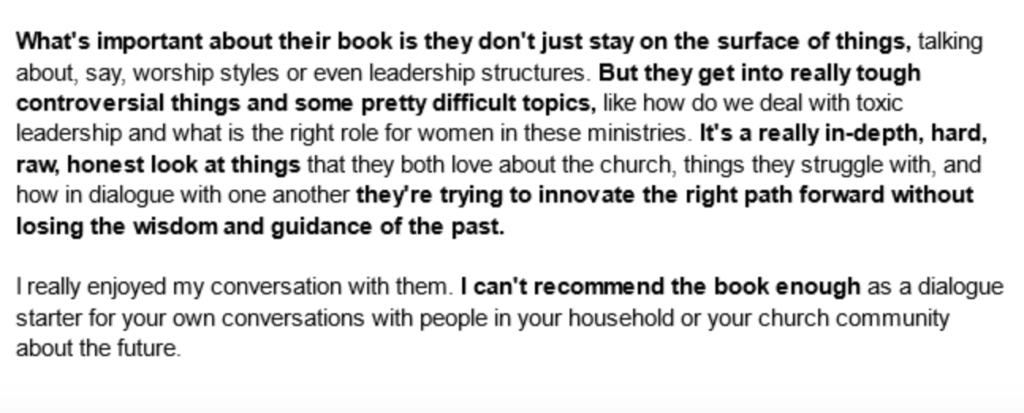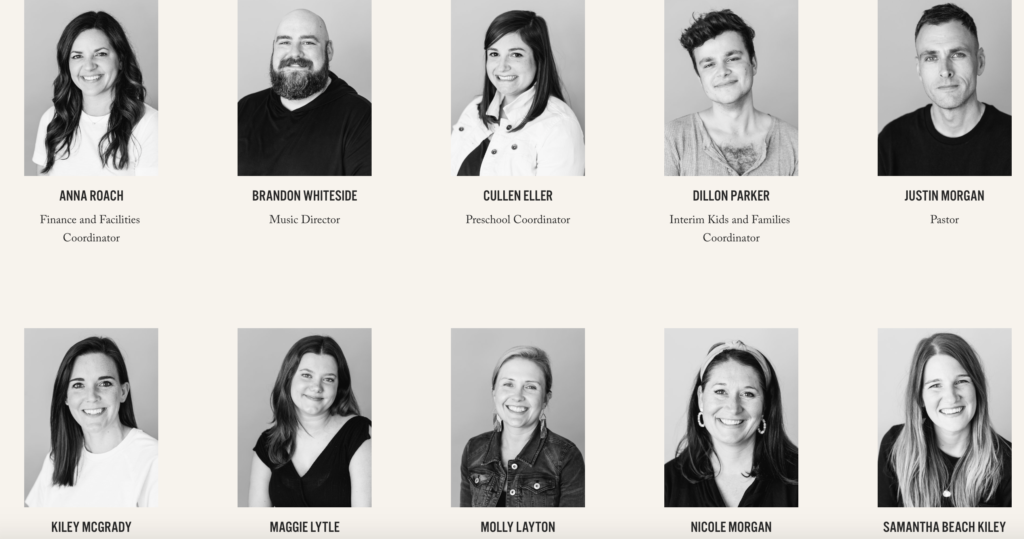Queering & Neo-Paganizing Evangelicalism

That's a photo of Samantha Beach Kiley, a pastor in North Carolina. This is eye-opening:
From the transcript (highlights are in the version Woke Preacher Clips provided). The speaker here is Skye Jethani, co-host of the podcast, with Phil Vischer:

Church on Morgan, where Samantha Beach Kiley, a theater kid, serves on the pastoral staff, describes its theological approach thus:
Church on Morgan is grateful to be a community made up of individuals who hold a variety of beliefs and perspectives. That said, we are rooted in the historic creeds of the Church (Apostle’s & Nicene) and shaped by the Methodist tradition. In regards to some of the more specific and frequently asked questions regarding our theology & ethics, we are proud to celebrate women and their gifts in all levels of leadership; include, affirm, and celebrate our LGBTQ siblings as a reflection of the creativity of God; and are committed to the work of antiracism both personally and corporately as we seek a more just and diverse future together.
From a website about SBK's vision (along with her mother's):
There is a big difference between diversity and full inclusion. Full inclusion is when you actually start paying attention to the cultural differences between people, and your leadership team leans into the different perspectives from those cultures.
Every church is less than a decade away from becoming a country club. Because churches become insulated. Our financial model and our decision making model is all controlled by insiders. Leaders must bring intentionality and focus toward meeting needs that maybe they don’t have, but others in their community do have.
Here's a photo of the Church on Morgan staff. Look at all that diversity!

In truth, I don't care if the church's leadership staff is all-white and all-young, any more than I care if a historically black congregation's leadership is all black. The theology matters more than the surface diversity. Still, I would be very surprised if there are any theological conservatives in that congregation. I'd bet money its "cultural differences between people" who worship there runs the gamut from A to B. And again, so what? I only bring it up because white liberals bang on incessantly about Diversity and Inclusion, but, well, look at this staff.
They might not have any black, Latino, or Asian people in that congregation. Maybe it skews white, middle-class, and liberal. Is that a big deal? If they were discouraging people of other races from attending, yeah, that would be a big deal. I'm sure they don't do that. It might well be the case that the kind of Christians who are drawn to this congregations theology and worship style are typically white, liberal, and young. I dunno; I'm guessing. My point is simply that it appears that SBK is quick to pass judgment on the lack of inclusiveness practiced by other churches, but in her own? I'd like to know more.
I think there's nothing at all wrong with not including theological conservatives, if the church's theological stance is liberal. Why should people who disagree with the congregation's fundamental principles want to worship there? Would any of the people pictured above want to attend a robustly conservative church? Probably not, for the entirely defensible reason that they believe that theology is mistaken. I bring it up simply to point out how shallow and self-deceiving it is to get on one's high horse about how other churches are on their way to being country clubs because they only cater to people like themselves, when your own church has drawn some clear lines about theological truth. SBK's earlier congregation, a progressive one in Texas called Austin New Church, says this about itself:
ANC is a progressive, affirming, gospel-centered community of people driven by inclusion and social justice. Many of us live in the Austin area. But an increasing number of us live around the country and around the world.
We believe community is based on belonging, not beliefs. Beliefs will follow. Often. As will doctrines and dogmas and denominational distinctives. But not always. Many of us won’t end up believing the same things. And that’s ok. Unity requires a commitment to belonging not belief.
What holds our community together are the values we share, not our beliefs.
How does that make any sense for a church? It doesn't matter what you believe, as long as you show up on Sunday? What use is that to ongoing conversion and discipleship? It sounds like what they really worship is the community itself. Besides, I don't believe that a church that orients itself around pursuing "social justice" (as it says on its website) is not centered around beliefs. The distinction that church makes between "values" and "beliefs" is highly tendentious, to the point of being comical.
Anyway, here's a link to a clip of Nancy Beach (who took a brave public stand in calling out Willow Creek founding pastor Bill Hybels's alleged sexual misconduct) and her daughter Samantha having a conversation promoting the Divine Feminine, and denying that God, who has revealed himself in masculine terms, is male. Of course God does not have a "gender" in the human sense, but the Church has always recognized that God, for whatever reason, has revealed Himself as Father, Son, and Holy Spirit. God is not Non-Binary! To deny God's masculinity is to call Scripture a lie. It is to read 21st century middle-class Western liberal social values into Scripture, in opposition to Scripture's unambiguous teaching, and two thousand years of church teaching.
It is to neopaganize Christianity. That's what this ultimately amounts to. Remember that Skye Jethani "can't recommend the book enough" -- the book that the mother-daughter feminist pastors wrote together. Why does Skye Jethani recommend this teaching? It's one thing to have controversial people on a podcast to debate their ideas; it's quite another to endorse those ideas. On his website, Jethani describes his beliefs briefly, like this:
Skye affirms the Apostles’ Creed and the Nicene Creed as essential articulations of Christian faith and often points to The Lausanne Covenant as a valuable summary of the historic, holistic, and global Christian tradition he belongs to.
The Nicene Creed begins like this:
I believe in one God,
the Father almighty,
maker of heaven and earth,
of all things visible and invisible.I believe in one Lord Jesus Christ,
the Only Begotten Son of God,
born of the Father before all ages.
God the FATHER almighty. Jesus Christ, the only begotten SON of God, born of the FATHER.
Subscribe Today
Get daily emails in your inbox
What the Beach women teach is dangerous heresy. How can Skye Jethani, an ordained pastor and prominent Evangelical voice, give such a full-throated endorsement to their work, and still call himself a Nicene-Creedal Christian? What's going on here? I'm not Evangelical, and don't know much about that world, so I welcome correction. But as an outsider, it seems to me like this kind of thing introduces a form of neopaganism into the church, whether its advocates realize it or not -- and Skye Jethani, who, I understand, has a reputation as a more mainstream voice, is giving it credibility. The German Catholic bishops are doing something similar. In my Orthodox Church, voices have arisen -- white liberal voices, naturally -- advocating fundamental changes to our theology, while downplaying what they are doing.
I can't figure out if it's worse if they know what they're doing, or not. Whatever, it was a good catch by Woke Preacher Clips, who you should follow on Twitter.
UPDATE: Why do I care about this stuff when I'm not even Evangelical? one of you asks. Because I'm watching basic Christian orthodoxy in every church get hammered hard by the post-Christian culture and its beliefs, and it seems to me that many, maybe even most, Christians don't even see what's happening. Once it's gone, it will be very hard to get it back.